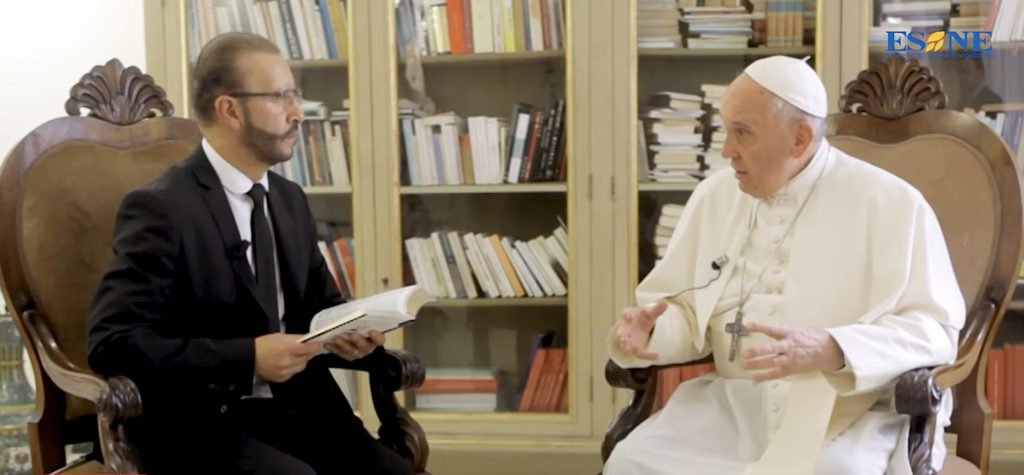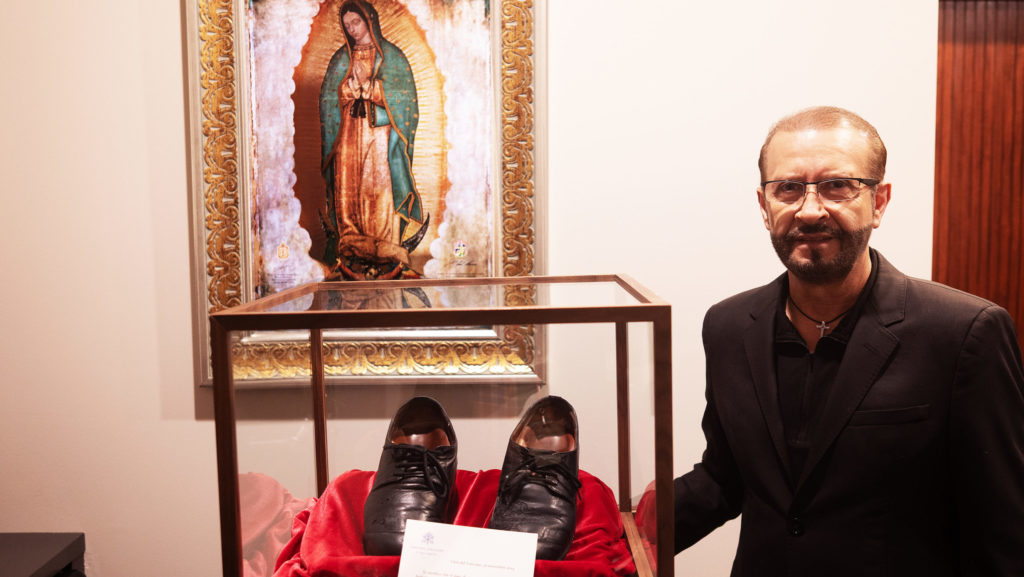His battered black shoes showed wear from prayer and intercontinental ministry last year when Pope Francis gave them to Noel Díaz, an evangelist and journalist from Los Angeles, as a sign of their friendship and of Jesus’ call to seek those on the peripheries.
Now, in death, Francis has also left Díaz and the Church another legacy: a newly released video in which he reflected on Peter, the first pope.
The pope and the journalist had bonded in 2016 when Díaz, once a street-corner shoeshine boy in Tijuana, shined Francis’ shoes on the papal plane as a symbol of the dignity of workers. Years later, Díaz told him, “Since I never had a dad who was close to me, I feel that you’re my dad. And he would give me advice on a personal level.”
Now a businessman and founder of the ESNE Spanish-language Catholic television and radio network, Díaz’s childhood home was a cardboard shack in Tijuana. His father had left, and his mother peddled knick-knacks outside Our Lady of Guadalupe Cathedral.
In 1963, he was preparing for first Communion when he heard his mother tell the catechist that he had to withdraw because she couldn’t afford the requisite black pants and white shirt for the Mass. He began shining shoes to pay for those clothes himself.
Later, the family crossed the border into the U.S. without documents. He was deported twice before becoming legalized. While responding to a friend who had become a Pentecostal, Díaz began studying the Bible. That led to a profound conversion, inspiring him to teach others about the Catholic faith.
He became a lay minister at St. Thomas the Apostle Church near downtown LA, while building a thriving optical business. He and his wife, Sara, have three grown children.
In 1984, he and some friends started a modest Spanish-language media outreach, “El Sembrador” (“The Sower”), or ESNE. It now operates in 20 countries and has more than 100 full-time employees. Díaz, however, continues to work as an optician, not taking a salary from ESNE so that no one can suspect him of profiting from his ministry.
“I have two jobs, and they both have to do with helping people see better — spiritually and physically,” he said.
In 2016, Díaz was granted a seat among the reporters on the papal plane to Cuba and Mexico. He decided to bring the pope a gift — a replica of the shoeshine box he had carried as a 7-year-old. It symbolized those who work hard, have great faith, but remain poor.
A brief meet-and-greet turned into at least 15 minutes, concluding with Díaz asking Pope Francis if he could shine his shoes. He did so as other journalists snapped photos.
“At the end, I told him, ‘I’m not a journalist. I’m an evangelist,’ ” Díaz said.
Months later, Francis invited him to visit.
“He said, ‘There are some things in this life that you just can’t forget and that [shoeshine] is one for me,’ ” Díaz recalled. They met often over the next eight years.

In 2021, Díaz interviewed Francis about his reflections on the apostle Peter, intending to make a documentary. The video was so powerful — and potentially explosive in a papacy where critics twisted papal comments — that Díaz never released it. He didn’t want to bring more unwarranted grief on the man he had come to regard as the father he never had.
Francis had spoken of popes who erred — and of how the Holy Spirit guarded them against violating the faith itself. He described why Jesus chose the clearly imperfect Peter to hold the keys to the kingdom: Peter had the humility to recognize his own sinfulness.
“When Jesus anoints him bishop, priest, he anoints him because he is a shepherd,” Francis said in the video. “He doesn’t anoint him to promote him, in order for him to be the head of an office. He doesn’t anoint him to organize the country politically. No, he anoints him to be a pastor.”
Last year, Díaz arranged for about 200 of his ESNE co-workers to have a Nov. 28 audience with Francis — who commended them especially for their ministry to migrants. The two also met privately. Francis joked about needing another shoeshine — and left Díaz a pair of his shoes as a gift.
They were worn, creased and scuffed, which Díaz saw as a sign of a Church moving beyond its own doors to reach those who are marginalized. “He has given us that legacy of serving our brothers and sisters,” he said.
Following his frightening hospitalization in February and March, by Easter Sunday, Díaz thought Francis seemed well enough for him to think about their next visit.
“That night, I got a call from a priest at the Vatican, hours after he passed,” Díaz said.
He still finds it hard to believe, despite attending his funeral and spending 30 minutes praying next to his body.
“I was remembering every time I’ve met with him and it was very emotional,” he said.
He is glad that Francis is no longer in pain. But “as a member of the Church and as a son, you know that need to have a dad when you need advice or something from him.”
Díaz had never told his staff about the 2021 interview. But he started to listen to it — and was unable to finish.
“It impacted me. I said, ‘Wow, what a message,’ ” he said.
He showed it to friends at the Vatican’s Dicastery for Communications, who asked if they could release it on Vatican News. Díaz gave permission, passing up what could have been an exclusive story for his own network in favor of a global audience and multiple translations.
“I always said that I didn’t want to be someone who was always trying to get attention,” he said.
As the “cardinals are preparing for the conclave, there’s a message for them — and for sure, the new pope will hear that message.”

